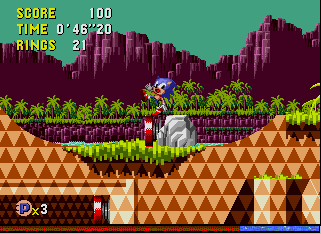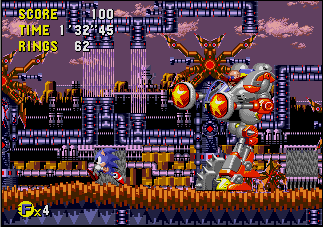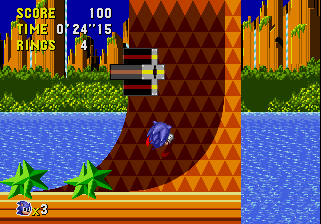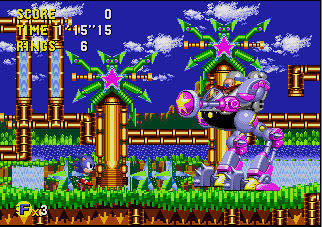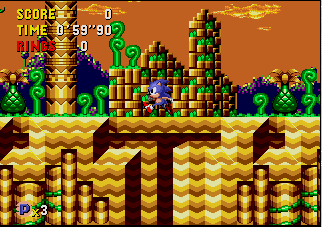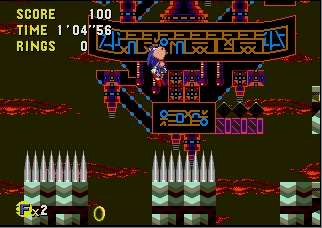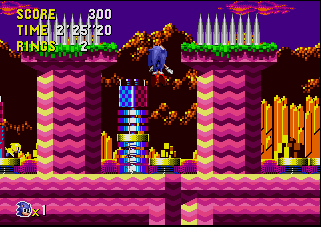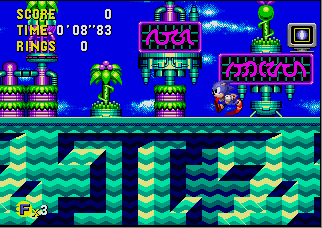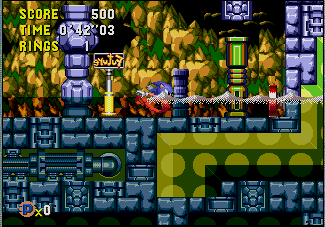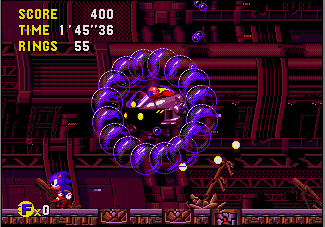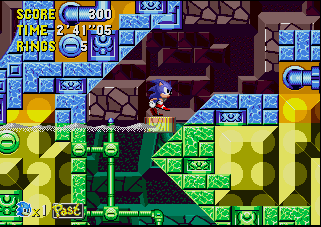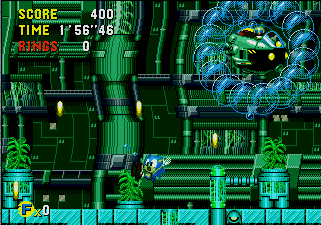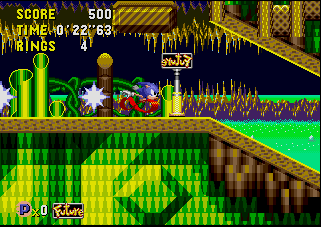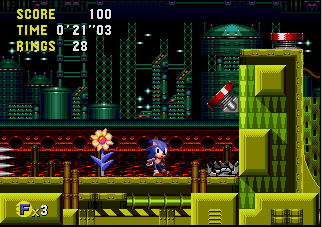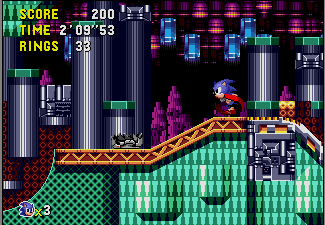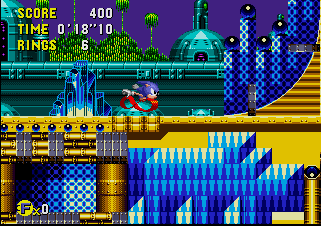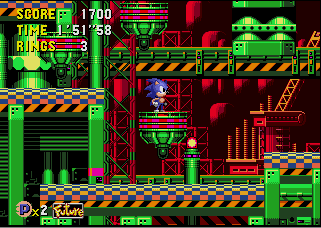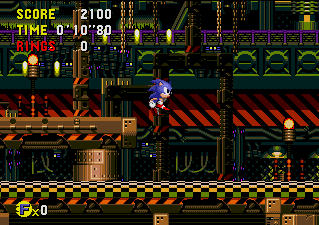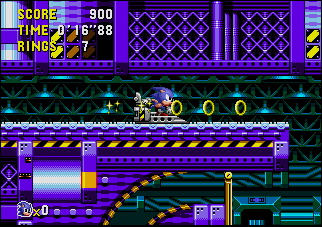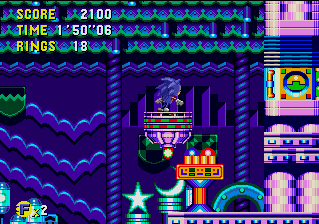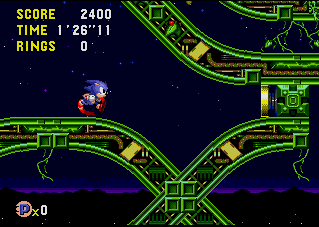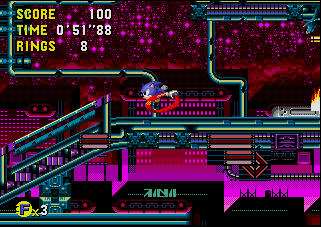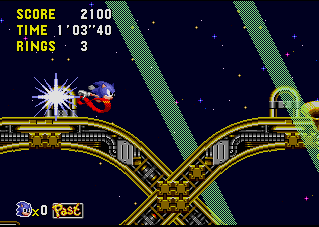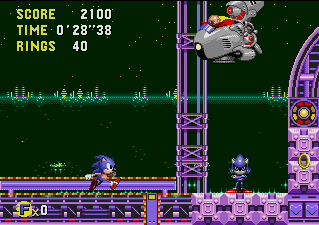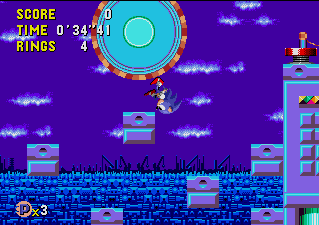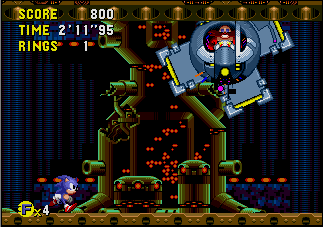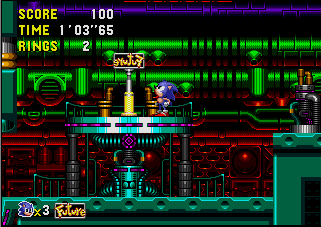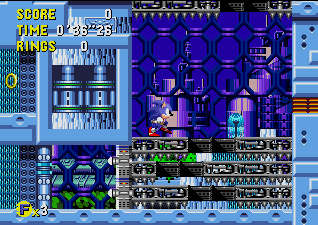|
-- Sonic CD --
|
Formats: Sega CD/Mega CD, PC
Genre: Platformer
Developer: Sega of Japan
Rating: GA/K-A
Debut: September 23, 1993 (Japan)
Cast: Sonic the Hedgehog, Amy Rose, Metal Sonic, Dr. Ivo Robotnik/Dr. Eggman
|
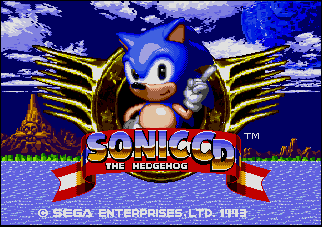
| |
Dr. Robotnik's latest scheme involves the mysterious Little Planet, which appears on the last
month of every year over Never Lake. The Little Planet houses the seven Time Stones, with which
the holder obtains the ability to travel through time and space. With the control of time,
nothing could stop the Eggman. Not to freak, because Sonic the Hedgehog is on the case!
Unfortunately, Robotnik has decided to unleash Metal Sonic to keep the hedgehog hero at bay; and
kidnap Amy Rose to further complicate the problem. Infact, Robotnik's already made use of the
Little Planet's lack of any boundaries on time, and has placed robot machines in the past so he
controls the future. Now Sonic's got to stop Robotnik, destroy the robot machines, collect the
seven Time Stones, save Amy Rose, and deal with Metal Sonic, all on a tiny planet where time has
no meaning. A hedgehog's work is never done...
|
|
-- International Info --
| |
Area
|
Title
|
Debut
| |
Japan
|
Sonic the Hedgehog CD
|
September 23, 1993
| |
Europe
|
Sonic CD
|
October, 1993
| |
USA
|
Sonic CD
|
November 19, 1993
|
Sonic's first (and last) appearance on the Sega CD was quite a refreshing change from his
previous adventures. Gameplay was still largely the same (run, spin, collect Rings, etc.), but
several major design differences were implemented.
Most noticably, the ability to travel through time. By spinning a sign marked "Past" or
"Future", then gaining up to max speed without stopping for three seconds, Sonic is warped to the
specified time in that Zone's existence. The differences were mostly visual, but there were also
some slight variations in level-design. The correct way to play each Act was this way: start off
in the Present. Hop a ride to the Past, then locate and destroy the robot machine. For extra
points, also locate and destroy the Metal Sonic hologram. There should be no more Badniks in the
Past. Hope a ride back to the Present, where things will be just as they were before you left.
Finally, zoom into the Future, to behold the Good Future, a place with beautiful music, scenery,
dancing animals, and no Badniks whatsoever. Check out the Future before destroying the robot
machine in the past, and you'll be in a grimy, mechanical place akin to those polluted factory
Zones Robotnik hangs out in.
Other differences included the noticable lack of everyone's fox buddy, Tails, despite the fact
that the game was released well after Sonic 2. The Sonic 2 Spin Dash was worked in, although
performed quite differently from the Spin Dash we're used to using. On the subject of moves,
Sonic CD introduced the Peel-Out, arguably Sonic's coolest move ever. Sonic runs at such a
speed, his legs blur into a figure eight. The move is identical to the Spin Dash, except Sonic's
in standing (not spinning) form, and is thus vulnerable to attack. Making it useless for the
most part, but justifiable on its "cool" merit alone.
Time Stones replace traditional Chaos Emeralds, but Special Stages are played the same way...beat
one to get a Time Stone. The Good Ending may be obtained by collecting all seven Time Stones, or
merely earning a Good Future in each Act.
The final major difference is in the way bosses are fought. Rather than the usual 8 hits, these
bosses only require three. Of course, the trade-off for this is that it's much more difficult to
get a hit in edgewise...
Sonic CD is considered by many to be the best of the Sonic series so far. A bit ironic,
considering the game was not made by the original Sonic Team. Despite this fact, it is of
world-class quality, and more than worthy of the Sonic name.

|
Behind the Screens
From what I gather, Sonic CD was actually being developed at the same time as Sonic 2, and was
intended to be released before. However, as things turned out (probably because Sega didn't want
two major Sonic games being released at once), Sonic CD didn't hit the market until a year later.
This would explain the lack of Tails. (Actually, our pal Miles did make a small cameo in one of
the art screens, with the greeting: "See you next game!" Interestingly enough, he was holding a
helmet and standing next to a jeep. Now we know what Tails was doing while the others were hard
at work on Sonic CD. The slacker.)
Although there was no translation to be done at all in the game, the US release didn't come until
three months after the game hit Japanese shelves. This was due to the fact that the music was
being completely re-done by the talented Spencer Nilsen, who was also the man behind other spiffy
Sega CD (and a few early Saturn) soundtracks. Mr. Nilsen's tracks received much flak from fans
who wanted an untouched game for the US release. While it's true that ol' Spencie's tracks
weren't quite on par with the original Japanese ones, they were still great nonetheless, and
superior in some ways.
|
|
Palmtree Panic Zone: Countless waterfalls pour from jagged cliffs high in the air into the
sparkling bay below. Star-shaped plants and broad palmtrees color the rocky hills.
|
|
Collision Chaos Zone: Rounded hilltops carry the horizon across this wild arena.
Bumpers and springs keep things moving across the colorful, surreal landscape.
|
|
Tidal Tempest Zone: Sparkling caverns weave underneath a fiery range of volcanoes.
Crystal pools flow through the tunnels, cooling the rocky cave walls.
|
|
Quartz Quadrant Zone: Colorful crystals and other minerals grow along the stony walls of
this massive underground cavern. Mining rails lead a clear path through this secluded cave.
|
|
Wacky Workbench Zone: Electrical conduits, windy vent pipes, and unreliable footing are
the key features in this wacky construction site. A strange goddess statue in the past rewards
Sonic with Rings, while a Robotnik statue in the future napalms him with mines.
|
|
Stardust Speedway Zone: Searchlights flare up the night sky, as music from the city below
fills the air. Wild vines crawl up this aerial highway, where speed limits are optional.
|
|
Metallic Madness Zone: Pounding pistons, grinding saws, and similar noises echo off the
metallic walls. Corridors weave within and around each other in this fantastic mechanical maze.
|
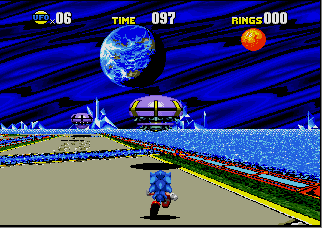 Special Stage: Vast domed cities with wild skies set the backdrop for high-speed race
courses; littered with bumpers, water traps, and other obstacles to slow Sonic's run for the six
UFOs.
Special Stage: Vast domed cities with wild skies set the backdrop for high-speed race
courses; littered with bumpers, water traps, and other obstacles to slow Sonic's run for the six
UFOs.
|
|
|
| |
Level-select: (Sega CD version) At the title screen, press: Up, Down, Down, Left, Right,
B, START.
Pro Scores: (Sega CD version) At the title screen, press: Right, Right, Up, Up, Down, C,
START.
Sound Test: (Sega CD version) At the title screen, press: Down, Down, Down, Left, Right,
A.
Construction Mode: (Sega CD version) Input the Sound Test code. Adjust the numbers to
match these settings: FM#40, PCM#12, DA#11. Press START. Begin a normal game. Controls are as
follows:
A = Changes highlighted item.
B = Toggles between items and Sonic.
C = Places highlighted item.
Hidden Special Stage: (Sega CD version) Input the Sound Test code. Adjust the numbers to
match these settings: FM#07, PCM#07, DA#07. Press START.
Art Screens: (Sega CD version) To access these hidden art screens, input the Sound Test
code and adjust the numbers to match the indicated settings:
- DJ Sonic: FM#42, PCM#03, DA#01
- Sonic on Drugs: FM#46, PCM#12, DA#25
- Demonic Sonic: FM#42, PCM#04, DA#21
- Kawaii Sonic: FM#44, PCM#11, DA#09
I'm outta here!: (both versions) At any point in any Zone, leave Sonic standing perfectly
still (don't pause the game!). After three minutes, he'll say: "I'm outta here!", and race off
the screen. This ends your game...
Level-Select: (PC version) At the title screen, press: Up, Down, Down, Left, Right, SPACE.
Pro Scores: (PC version) At the title screen, press: Right, Right, Up, Up, Down, SPACE.
Sound Test: (PC version) At the title screen, press: Down, Down, Down, Left, Right, SPACE.
Hidden Special Stage: (PC version) At the Sound Test menu, adjust the numbers to match
these settings: PCM#07, DA#07.
Hidden Art Screens: (PC version) At the Sound Test menu, adjust the numbers to match the
indicated settings:
- DJ Sonic: PCM#03, DA#01
- Sonic on Drugs: PCM#04, DA#21
- Demonic Sonic: PCM#12, DA#25
- Kawaii Sonic: PCM#03, DA#01
|
Screenshots thanks to Jonathan "WB" Gray. PC version shown. US Sega
CD box cover thanks to "SonicBlu". PC box cover from Sega
Online. Information compiled and arranged by Jared
"Green Gibbon!" Matte.
|


